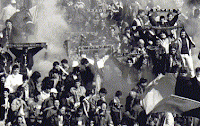The history of Botevism is a magnificent novel of adventures, inspired by
true friendship and pure passion. All ingredients are there – love,
hatred, joy, pain, frays, scandals, rage, tears. Once upon a time...
Whenever stories about ultras of Botev, so-called Bultras, penetrate Bulgarian media they invariably come dripping with negative connotations - extreme chanting, violence and dirty war against former club owner and other depressing accounts. All these help portray the Botev's supporters as a repugnant bunch of ignorants. In recent decade the Plovdiv`s football obsession has become renowned nationwide for a certain type of urban subculture. However,
the local terrace culture is still in its juvenile years since it arose in late 90s when hardcore fans started to gather and come into their own, modelling themselves on the unruly way known as Ultra` on the stands in Europe. Unfortunately not the whole story is covered in English, so the
curiosity might be satisfied if glimpse upon their pictures from glory
days ago, from Plovdiv mid-90s and so...








Once upon a time there was a tavern
Where we used to raise a glass or two
Remember how we laughed away the hours
And think of all the great things we would do
Those were the days, my friend
We thought they'd never end
We'd sing and dance forever and a day
We'd live the life we choose
We'd fight and never lose
For we were young and sure to have our way
("Those Were the Days" is a song credited to Gene Raskin, who put English lyrics to the Russian song "Dorogoi dlinnoyu" ("Дорогой длинною", lit. "By the long road"), written by Boris Fomin (1900--1948) with words by the poet Konstantin Podrevskii. It deals with reminiscence upon youth and romantic idealism. The Georgian Tamara Tsereteli (1900--1968) in 1925 and Alexander Vertinsky in 1926 made what were probably the earliest recordings of the song. However, it is best remembered for Mary Hopkin's 1968 recording, which was a top-ten hit in both the U.S. and the U.K. On most records of the song, Gene Raskin is credited as the writer of the song, even though he just wrote the English lyrics and not the melody.)
















.JPG)




























No comments:
Post a Comment